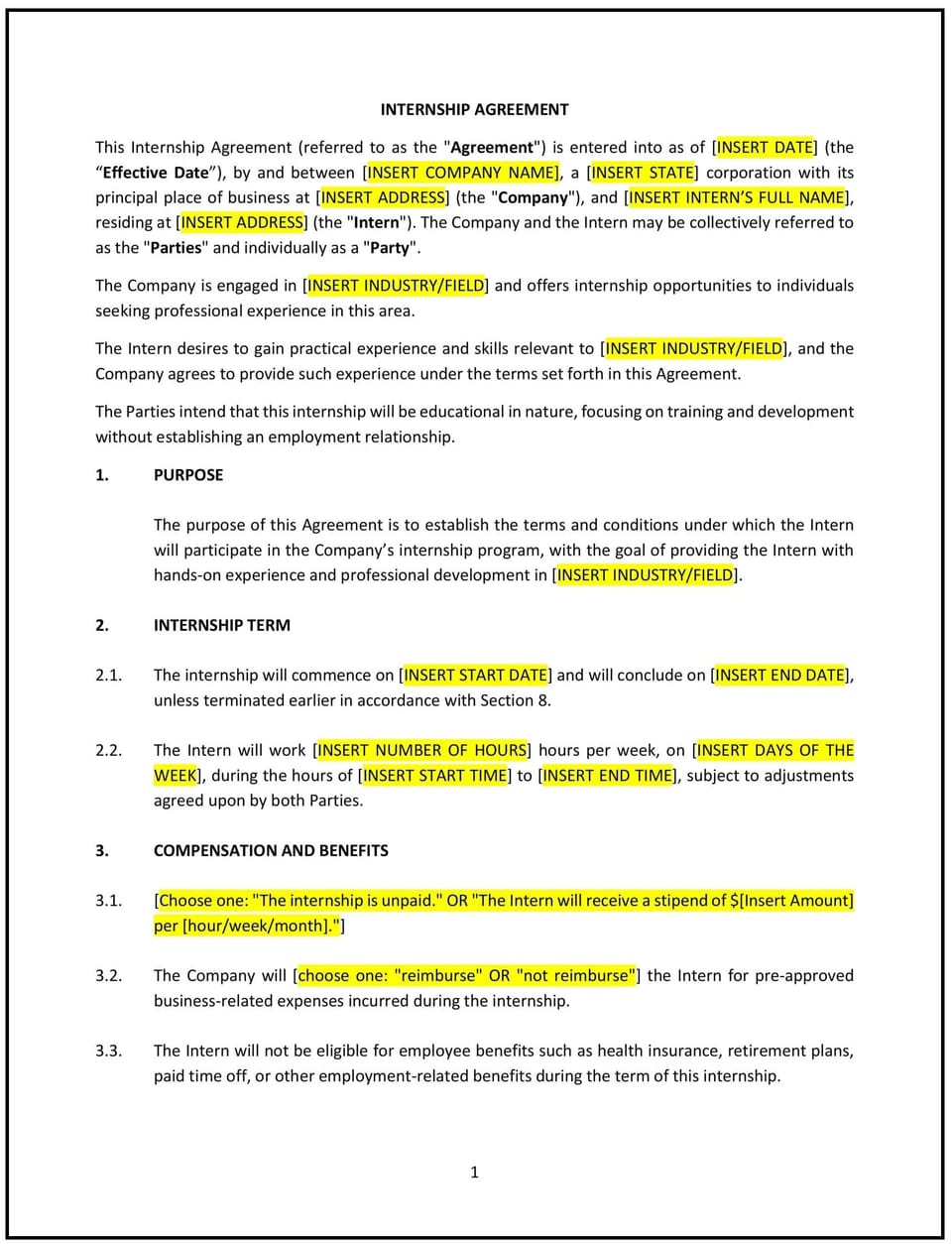Internship Agreement (Wisconsin): Free template

Internship Agreement (Wisconsin)
An Internship Agreement is a legal document that outlines the terms and conditions of an internship between an intern (the Participant) and a company or organization (the Host). In Wisconsin, these agreements are governed by state labor laws and must align with federal regulations, including those set by the U.S. Department of Labor. A well-drafted Internship Agreement clarifies roles, responsibilities, compensation (if applicable), and adheres to Wisconsin’s requirements.
For example, a Madison-based healthcare provider might hire an intern from the University of Wisconsin to assist with patient care coordination. A clear Internship Agreement helps define expectations, protect both parties’ rights, and meet Wisconsin’s standards.
Tips for drafting and maintaining an Internship Agreement in Wisconsin
- Identify the parties involved: Clearly specify the names, addresses, and roles of the Host organization and the intern.
- Example: “This Internship Agreement is entered into by [Host Organization Name], located at [Address], and [Intern Name], residing at [Address].”
- Define the purpose of the internship: Describe the goals and objectives of the internship program.
- Example: “The purpose of this internship is to provide [Intern Name] with hands-on experience in healthcare administration, including patient scheduling, record management, and team collaboration.”
- Specify the duration and schedule: Outline the start and end dates of the internship, as well as the expected hours of work per week.
- Example: “The internship will commence on [Start Date] and conclude on [End Date]. The intern is expected to work 20 hours per week, Monday through Friday, between 8:00 AM and 4:00 PM.”
- Clarify compensation (if applicable): State whether the internship is paid or unpaid and include details about stipends, reimbursements, or academic credit.
- Example: “This internship is paid, with the intern receiving $15 per hour, payable bi-weekly.”
- Outline roles and responsibilities: Clearly define the tasks and duties the intern will perform during the internship.
- Example: “The intern will assist with managing patient records, coordinating appointments, preparing reports, and attending staff meetings.”
- Include confidentiality and intellectual property clauses: Protect sensitive information and clarify ownership of any work created during the internship.
- Example: “The intern agrees to maintain the confidentiality of all proprietary information disclosed during the internship and assigns all intellectual property rights to the Host Organization.”
- Address termination terms: Specify the conditions under which the internship may be terminated by either party.
- Example: “Either party may terminate this agreement with a written notice of 7 days if the other party breaches any terms of this agreement.”
- Outline governing law and jurisdiction: Ensure the agreement specifies that it is governed by Wisconsin law and identifies the appropriate courts for dispute resolution.
- Example: “This agreement is governed by the laws of the State of Wisconsin. Any disputes arising under this agreement shall be resolved in the courts of [County], Wisconsin.”
- Include signatures: Both the Host and the intern must sign and date the agreement to make it legally binding.
- Example: “IN WITNESS WHEREOF, the parties have executed this Internship Agreement as of the date first written above.”
Frequently asked questions (FAQs)
Q: What makes an Internship Agreement valid in Wisconsin?
A: A valid Internship Agreement must clearly outline the terms of the internship, be signed by both parties, and comply with state and federal labor laws.
Q: Are unpaid internships allowed in Wisconsin?
A: Yes, but they must meet specific criteria, such as providing educational benefits and not displacing regular employees.
Q: What happens if the Host Organization fails to honor the agreement in Wisconsin?
A: The intern may seek remedies such as compensation or other legal actions as specified in the agreement or under state law.
Q: Is a written Internship Agreement necessary in Wisconsin?
A: While not always legally required, a written agreement is strongly recommended to avoid misunderstandings and ensure clarity.
Q: How can I ensure fairness in an internship program in Wisconsin?
A: Provide meaningful learning opportunities, clearly define expectations, and ensure compliance with state and federal labor laws. If unsure, seek guidance from a legal professional to address any uncertainties.
This article contains general legal information and does not contain legal advice. Cobrief is not a law firm or a substitute for an attorney or law firm. The law is complex and changes often. For legal advice, please ask a lawyer.


